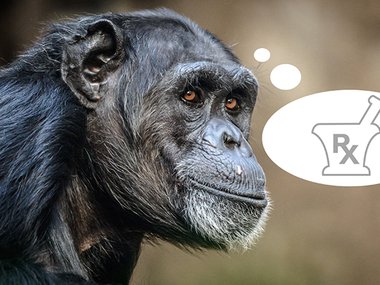Have you heard the phrase “no pain, no gain?" It’s often used in reference to working out, meaning the strain of exercise yields sculpted muscles. But perhaps that phrase could apply to more than just workouts.
Living things don’t like being in pain. Sometimes when we try to avoid or alleviate pain, we gain some new knowledge.
A team of researchers recently published their findings on a group of chimps that self-medicate when they’re not feeling well. This is a story about some good, old observational research. For a period of four months, scientists observed a group of chimps in Uganda. They kept up with the chimps urine, droppings and if they had any wounds.
The sick or hurt chimps were of extra interest to these researchers. They observed those ill chimps would go to a specific part of the jungle and eat a specific type of plant. After the chimps left, the scientists went over to the plants and took some clippings to try to understand what made those particular plants so special.
It turns out those specific plants happen to have antibiotic or anti-inflammatory properties! Through the course of this study, researchers observed the chimps using 13 different plants for various medical reasons. Interestingly, 11 of the 13 plants are also used by humans in the area as traditional medicine. This medical knowledge among the chimps is handed down and passed on to one another, helping ensure the greater group has this handy information for sick times.
These chimps are not the only animals that self-medicate, of course. Researchers around the globe have observed many different kinds of animal pharmacology in action. Dolphins rub their skin against corals and sponges that release antibacterial compounds to aid skin infections. Monarch butterflies often lay their eggs on anti-parasitic milkweed to give their hatchlings the healthiest shot at life. Orangutans have been observed chewing a vine with antibacterial properties and rubbing that vine on wounds to help them heal. Blackbirds, partridges, jays, pigeons and ravens all have been known to consume bay leaves as a means to relieve gastrointestinal stress.
Elephants, deer, weasels and many other animals have been observed doing things to reduce pain and raise the quality of their life through medicine. Looks like pain is something that living things just really want to avoid. From butterflies to humans, to avoid pain, we’ve had to gain some knowledge!

